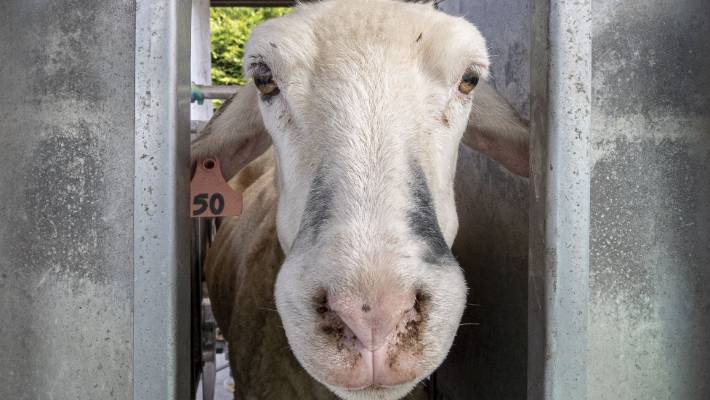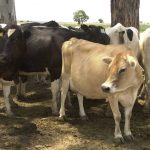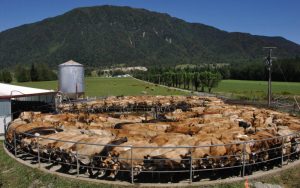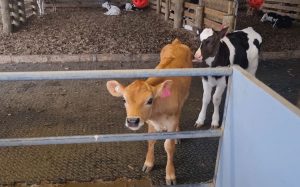
Three times a day, the 67-year-old farmer milks 120 sheep which graze over 40 hectares of her farm in Darfield, Canterbury.
In the evenings, Trafford and her husband, Guy, turn their sheep’s milk into greek yoghurt, sheep feta and halloumi cheeses, and sheep’s milk under their Charing Cross Sheep Dairy brand in a factory at their farm.
More recently, they have joined with a gelato producer and are whipping sheep’s milk into creamy gelatos – flavours like coffee, chocolate and strawberry.
“In the early days, a lot of people just about vomited when I said I milked sheep,” says Trafford. “But once someone starts on to it, they’re hooked. Now we can’t make enough of it. We’re exhausted.”
Since she started milking five years ago, she has been on a mission to educate and convert foodies at supermarket tastings and farmers markets in the South Island. In 2019, the couple opened a cheesemongery – Charing Cross Creamery – at the newly-opened Riverside Market in Christchurch.
“We’ve had a big part to play in giving people the chance to try it. There’s a lot less consumer resistance to it these days. Most of us have had a bad experience with goat’s milk and so people have a mental block about sheep’s milk.”
In Canterbury, everyone loves the Traffords’ story – their lambs are kept with their mothers until they are weaned and the couple make all their products on site.
“Townies really want the story behind where their food comes from and they are looking for something different,” she said.
When the couple launched Charing Cross Sheep Dairy in 2014, there were only four sheep’s milk producers in the country. Today, there are 17, and it’s a growing market worth $16.7 million.
Much of New Zealand’s sheep’s milk is a commercial operation run by big producers like Antara Ag, Blue River Dairy and Spring Sheep Milk Co, which turn sheep’s milk into milk powder and infant formula for the export market. However, seven of the 17 are family-owned artisan sheep’s milk producers, milking their own ewes and turning the milk into sheep’s milk, sheep’s milk yoghurt, cheese and icecream: Charing Cross is joined by Craggy Range Sheep Dairy and Sentry Hill Organics in Hawkes Bay, Waimata Dairy in Gisborne, Kingsmeade Artisan Cheese and Fernglen Farm in the Wairarapa, and Winsam Farm in Kerikeri.
Despite the growth, sheep’s milk is still enough of a novelty that it is hard to find in mainstream supermarkets. It is also more expensive than cow’s milk – Fernglen sells a one-litre bottle of sheep’s milk for $8.50. For those concerned about climate change, though, sheep’s milk is a better drop – producing sheep’s milk has a 30 to 50 per cent lower environmental impact than its cow’s milk equivalent, according to new findings supplied by Massey University.
It is also nutritionally superior to cow’s milk, according to Trafford, and the science backs that. For those who get eczema or upset digestive systems from cow’s milk, sheep’s milk is easier to digest, as it contains A2 type proteins. A cup of sheep’s milk has double the amino acids, protein, fat, calcium and magnesium to cow’s milk. It is also high in B12 and folate.
Craig Prichard, a Massey University associate professor in the business school, co-runs the annual Sheep Dairy conference in late March. He’s also a former sheep milker, who until last year had a herd of 20 ewes he regularly milked on a 10-acre lifestyle block in Manawatu.
Making sheep’s milk yoghurt for his own use at home, he still has 50kg of frozen sheep’s milk to turn into yoghurt. “I spend my days in front of a computer and teaching students. Being able to milk sheep and make yoghurt on a 10-acre block was a great adventure for us for five years.”
Prichard says that sheep’s milk is the basis of some great cheeses in Italy and Spain. Here in the 1800s, settlers drank sheep’s milk, and sheep were considered to have three roles – providing meat, wool and milk. That attitude changed over the years – and the industry had highs and lows.
“The socialised palette of New Zealand’s middle-classes today means that we are more willing to experiment with new foods like this one.”
He also points to the impact on climate change. For every litre of cows milk produced, you can make triple the amount of sheep’s milk for the same carbon footprint. “It is lower density farming so it doesn’t produce the methane.
“But getting access to sheep milk and the interesting range of sheep’s cheese, yoghurts, ice cream and fresh milk is the challenge. It can be a stretch finding them.”
Although Prichard expects that with the right push and consumer demand, sheep’s milk could be more readily stocked in supermarkets – something he hopes to see.
In Hawkes Bay, Kate and James Clairmont have stopped milking to give their 100 ewes a rest before they are put out in the pasture for the breeding season. Home is a rambling 67-hectare property on Craggy Range Road, just above the Tuki Tuki River, where Kate Clairmont talks about her East Friesian milking ewes as “the girls”, knowing them either by name or number.
Each morning, they amble into the milking shed. Clairmont knows who will come in first – and who will hover to the back of the queue. Ten minutes later, milking is over and they wait for one another under the shade of the trees. Like the other artisan producers, the Clairmonts practise ethical farming, keeping the ewes with their lambs for as long as possible.
Twice a week, a chiller truck arrives to take their milk to Hohepa, where the creamy sheep milk is turned into Craggy Range Sheep Dairy cheese – pecorino (an Italian cheese) and Manchego (a Spanish style sheep’s cheese). They’re hoping to stock their cheeses in specialty stores and they also send to customers and restaurants direct.
In the milking season from August to December, the couple bottle about three dozen bottles of sheep’s milk a week. “Sheep’s milk is as close to pure nature as you can get. It’s an alternative to other milks like oat and soy. People who try it often love it and become converts,” Kate Clairmont says.
Sheep’s milk is creamy to drink and not dissimilar to cow’s milk, Clairmont adds. “Some people think they can taste a muttony taste. At different times of the season, the milk behaves differently depending on what the ewes are eating. It’s an artisan product which means you get variations.”
She grew up on a sheep farm in Ashburton, an area that has now been converted to dairy, which concerns her. “The trees we planted as kids have all been pulled out. It’s like ground-zero down there. The rivers and water have so much run-off.”
“Sheep have such a light footprint on the land. Sheep milking also isn’t as intensified as cow milking. Dairy cows are milked 10 to 11 months a year, and we don’t do that. We give them a rest and we leave them to roam freely outside.”
At her tastings at Black Barn market in Havelock North, the mother-of-two finds that no-one has usually tasted sheep’s milk – daughter Lily, 7, won’t drink anything else now. “More people are starting to hear about it but to me it’s a no-brainer. It’s such a great product and I really think we should be drinking it more.”
Cameron Ravenwood didn’t like the taste of sheep’s milk the first time he drank it. The 22-year-old grew up on his 1200-hectare family farm in the Wairarapa, stretching down to Riversdale Beach. Each morning, he poured cow’s milk over his morning cereal. The Ravenwoods were sheep farmers, who two years ago decided to give sheep milking a go.
When he chats with Stuff, the young farmer has not long finished milking some of Fernglen’s 1000 milking ewes. Twice a week, he and his father, Jeff, drive their chilled milk tanker into Kingsmeade Cheese factory in Masterton, where it is bottled into fresh sheep’s milk and also three naturally-flavoured, prebiotic sheep’s milk drinks – coffee, chocolate and vanilla. The country’s biggest artisan sheep’s milk producer, Fernglen’s 1000 ewes pump out about 1200 litres of milk a week.
Sold in Moore Wilson’s Fresh and selected supermarkets, it is to date the only bottled sheep’s milk commercially available, although Kingsmeade sells frozen sheep’s milk at Commonsense Organics.
Ravenwood admits that some people “are scared to try it”. “There was huge resistance to start with, but most people are curious now.”
And at home, Ravenwood won’t drink anything else, and he has converted friends.
“The taste depends what the sheep are being fed. We are huge fans of keeping the milk really cold and minimally processed. It’s like a creamier, smoother version of cow’s milk.”
“It’s really exciting to be at the start of something which could be huge for New Zealand.”

























